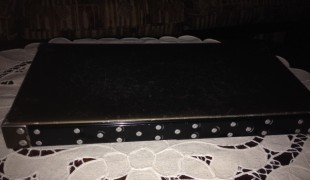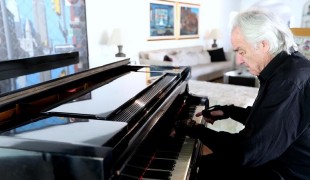- 9649
- 442
- 14
- 13
- 0
- Help Ukraine
About the solution
Jason became a C6/C7 incomplete quadriplegic in 1994, after a car accident, when he was driving home.
"[The doctors] said 'you're probably never going to walk and probably never going to play the drums again. It was like a nuclear bomb was dropped on my life. I thought my career was over”, he recalled.
Over the years, Jason regained the use of his arms, and he never gave up on his passion about the drums.
For a while, he got by with a special setup that triggered a bass drum noise when he hit a certain pad with a drumstick. But this system was not good enough for Jason.
So he built a technology that allows him to trigger a bass drum sound while continuing to play the snares, cymbals, and the rest of the drum set, using a mouthpiece. The inventor rigged the mouthpiece to control tiny rubber sensors under each cymbal. Anytime he sucks on the mouthpiece while simultaneously hitting one of the cymbals, a bass drum noise is triggered from a small subwoofer situated directly inside the bass drum casing.
He can move the sensors under any of part of the drum set. It took Jason ten years to develop this drum kit.
By 2004, Jason was playing the drums professionally, and now he has no desire to patent his innovation.
"If people want to know how to build their own triggers, then, by golly, they can just contact me. I'll give them the information for free. Encouragement shouldn't come at a price”.
Jason also started his own music production business, Jammin’ Grooves LLC.
Adapted from: http://cnn.it/2rhXY16
More info: http://www.wheelchairdrummer.com
https://youtu.be/GAL_z-gBSoQ
This solution shall not include mention to the use of drugs, chemicals or biologicals (including food); invasive devices; offensive, commercial or inherently dangerous content. This solution was not medically validated. Proceed with caution! If you have any doubts, please consult with a health professional.
DISCLAIMER: This story was written by someone who is not the author of the solution, therefore please be advised that, although it was written with the utmost respect for the innovation and the innovator, there can be some incorrect statements. If you find any errors please contact the patient Innovation team via info@patient-innovation.com
-
-
342
-
0
-
4593

Step articulated and mobile
MOVING IN A WHEELCHAIR: Moving using a wheelchair.
Traveling
Urban exploration
Paralysis
Assistive Daily Life Device (to help ADL)
Walking Aid (wheelchair/walker/crutches)
Restoring mobility
Promoting self-management
Managing Neurological Disorders
Building Supportive Community Relationships
Promoting inclusivity and social integration
Recovering from Traumatic Injuries
Maintaining Balance and Mobility
To improve Treatment/Therapy
Raise awareness
Caregiving Support
Neurology
Orthopedics
Rheumatology
Portugal
-
-
-
760
-
0
-
17005

Proloquo2Go – App to help people communicate
CAREGIVING
COMMUNICATION: Communicating, whether by speaking, listening, or other means
Social interaction
Paralysis
Autism
Cerebral Palsy
Brain Stroke
Brain Injury (Abscess, Brain Barrier Defect, Brain Contusion, Brain Hemorrhage, Brain Edema)
Assistive Daily Life Device (to help ADL)
Assistive Technology access
App (Including when connected with wearable)
Tremors
Muscle cramps or spasms
Difficulty coordinating movements
Muscle weakness
Difficulty speaking or understanding speech
Trouble with fine motor skills (e.g., writing, buttoning clothes)
Twitching or involuntary movements (myoclonus)
Acquired language impairment (Aphasia)
Promoting self-management
Managing Neurological Disorders
Building Supportive Community Relationships
Promoting inclusivity and social integration
Improving Speech and Communication
Caregiving Support
Clinical Pathology
Medical Genetics
Neurology
Pediatrics
Rheumatology
Netherlands
-
-
-
412
-
0
-
6660

Designer creates special gloves for pianist who had lost the ability to play
Playing an instrument
Dystonia
Body-Worn solutions (Clothing, accessories, shoes, sensors...)
Assistive Daily Life Device (to help ADL)
Loss of mobility
Trouble with fine motor skills (e.g., writing, buttoning clothes)
Restoring mobility
Managing Neurological Disorders
Promoting inclusivity and social integration
Neurology
Physical Medicine and Rehabilitation
Brazil
-
 en
en